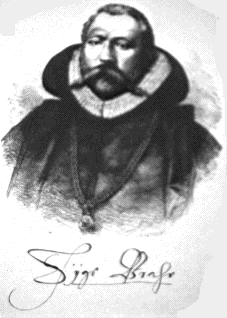Believe it or not, Whyville might have helped Tycho Brahe, had he been a
resident. How do I mean? Read on...
Tycho Brahe was born on December 14, 1546 in Knudstrup, Denmark.
At age 13 (!), he was sent to the University of Copenhagen and then to Leipzig
to study law.
However, after seeing an eclipse of the sun on August 21, 1560, he
became fascinated by the stars, and turned his studies to astronomy.
He mission was to study the exact positions of planets in the sky and to
chart their locations compared to the stars in the sky.
In 1565, while studying mathematics (part of his astronomy
studies) at the universities in Rostock, Tycho challenged another
student to a duel with swords during an argument over who was the
better mathematician. Tycho´s nose was
partially cut off, and he was said to have worn a gold and silver replacement
piece upon which he would continually rub oil. If he had been a Whyvillian, he
could've just visited Akbar's.
 |
| Tycho Brahe and his
signature
|
Not all of Tycho´s time was spent causing trouble. His big break in
astronomy occurred on November 11, 1572, when he looked into the sky and saw
an extra star in the constellation of Cassiopeia. He instantly summoned his
assistant to
confirm that the star really was there. This "star" appeared and was visible
for about 18 months before fading from view. He was not the first to see
the new star (we know now that this was really a supernova, which is an
exploding star, not a new star), but Tycho´s observations showed
that the supernovae stayed still with respect to the other stars. Though
everybody believed that the heavens did not change, he now had evidence
that contradicted this.
On May 23, 1576, by royal decree, the Danish King Frederick II
gave Tycho the island of Hven, east of Copenhagen, as well as money,
to allow Tycho to carry out his astronomical research. Tycho took
full advantage of his independence and financial security and
built the Uraniborg Observatory on this island.
From his observatory,
Tycho studied the planets and the sun by comparing their locations against
the rest of the stars. In 1577, he observed a comet, which he determined
was further away than the moon. This went against the ideas of the times,
which was that a comet was something weird that occurred in the
earth´s atmosphere, and provided more evidence that the heavens did
indeed change.
After making observations from his island observatory for twenty more
years, Tycho proposed his own model of the Solar System that was an
intermediate between the two models that were being argued over.
The first model (Ptolemaic) argued
that the earth was the center of the universe. The second model (Copernicus)
argued that the sun was at the center of our universe, and that the planets
rotated around the sun.
(For more information on this, read Dr. Leila's article in her
series on the Sun.)
Tycho thought that the earth was at the center of the universe.
It proved to be wrong, but it was the most
widely accepted model of the Solar System for a while. His observations
were very accurate for the time, but he drew the wrong conclusions from
them because he failed to believe his own calculations.
Not everybody liked Tycho´s ideas. They were radical for the
time and, eventually,
this caused him trouble. After arguing with a new king, Tycho closed down
his observatory to look for a new source of financial support. In 1599,
he was appointed Imperial Mathematician to the Holy Roman Emperor, Rudolph
II, in Prague. Johannes Kepler joined him as an assistant to help with
mathematical calculations. However, his astronomical research program never
really got started again.
Tycho died in Prague on October 14, 1601, supposedly of a urinary infection
that he got while attending
a banquet hosted by a baron in Prague. The story was that he drank way too
much, but felt that table manners prevented him from leaving the table to
go to the bathroom before the host left.
Tycho´s conclusions about his data were not always correct,
but the quality of the observations themselves were important to the
development of modern astronomy.
After Tycho died, Kepler used Tycho's observations to prove
that the planets went around the sun, constructing our present model of the Solar System.